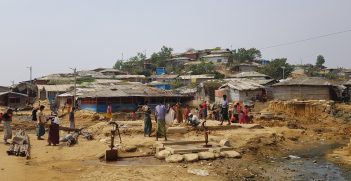How is the Global Energy Crisis Translating into Power Cuts in Bangladesh?

As global supply chains reel, Bangladesh, like many developing countries, has suffered from power outages. As the lack of electricity takes its toll on its citizens and businesses, how can Bangladesh navigate the global energy crisis?
Since last week power cuts have taken place across Bangladesh amid the summer heat. As the outages have become a recurring event, it has significantly disrupted the lives of citizens. On average, 2-3 hours of load shedding – an interruption in power supply to reduce shortage – is occurring in households each day. The government’s response has not inspired confidence: officials have stated that power cuts are inevitable given the current energy crisis, and the country must adjust to them. Other South and Southeast Asian countries are also experiencing power cuts in the last months as the energy crisis is looming worldwide. So, why is Bangladesh facing sudden power cuts? And how is it linked with current global crises?
Power Cuts in Bangladesh
Bangladesh has enriched its electricity production capacity to 25000 Mega Watt (MW). Regular demand is usually around 13000-15000 MW per day. As the demand is within the capacity of production, Bangladesh used to meet consumer electricity needs most of the time. As a result, during the last five to six years, power cuts became an unusual scenario.
Bangladesh’s main uses oil, gas, and coal to produce electricity. But since the pandemic and Ukraine crisis, oil and gas costs have increased drastically. The most recent hike increased the per unit gas price from US $25 to $38 in the world market, and the import of gas has substantially decreased as a result. Specifically, the gas supply to the national grid dropped to 510 million cubic feet while the usual supply was around 2.8 billion cubic feet. Due to the reduced supply power stations are not performing to their full capacity, leading to a decrease in power generation of 2000 MW per day. For instance, on 28 June, Bangladesh’s aggregate electricity demand was around 13,500MW, but its supply was only 11,500MW.
As the gas price skyrockets, the government is left with only two options. Either reduce production, allowing power cuts, or maintain the steady supply by increasing the cost of electricity at the consumer level.
Why is a Gas Shortage Taking place?
Though Bangladesh has gas fields, domestic extraction is insufficient as gas is also used in households and industries. So, Bangladesh imports a large quantity of gas, primarily from Middle Eastern countries.
Unfortunately, due to the pandemic, the Ukraine crisis, and the sanctions on Russia in response, the global energy market has taken a severe downturn. The cost of liquid natural gas (LNG) has surged by more than 1,000 percent in the last two years. Since the Ukraine invasion, Europe has attempted to diversify its energy away from Russian gas. As a result, the demand for LNG from other suppliers, such as Qatar, has dramatically increased.
At the end of June the gas price again surged by 60 percent due to the temporary closure of a vital gas facility in Texas. Concurrently, the Nord Streamline between Russia and Germany was shut down on 11 July for ten days of maintenance. Given the current conflict in Ukraine, many are sceptical that Russia will open it again. As a result of such a volatile scenario, Germany fears that an ensuing energy crisis could trigger a recession, a domino effect akin to the insolvency of Lehman Brothers – a financial giant that collapsed during 2008’s financial crisis.
However, as Europe looks for an alternative supplier in the Middle East, pressure is increasing on producer countries. The excessive demand has seen the price of gas surge, and as a result, countries from the Global South are finding it difficult to maintain steady imports. Hence, Europe’s demand is creating power cuts across Asia. Executive Vice President of Shell Steve Hill also recently remarked the same: “Europe is sucking LNG. But that means less LNG will go to developing markets.”
However, there is no shying away from the government’s own responsibility for the domestic energy crisis. A short-sighted energy plan, inefficiency in energy trading, indifference to renewable sources, and corruption in the energy sector also contributed to the predicament Bangladesh now finds itself in. The government also failed to predict the trend of energy market and introduce necessary rearrangement in its policy.
Power Cuts Across the Globe
As a result of soaring gas prices and the energy crisis, power cuts are taking place across the globe. South Asian states such as Pakistan, Nepal, and Sri Lanka, are already facing a shortage problem. India faced the same last month. Beyond South Asia, Japan also fears shortages and has called on its citizens to curb the use of air conditioning. Southeast Asian countries are also facing repeated power cuts.
Possible Ways Forward
Considering the current global scenario, it seems power cuts are likely for developing and least developed countries in the coming days. Bangladesh should also prepare for the reality as the energy crisis looms. However, diversifying import destinations is required to ensure cheap and uninterrupted imports. In this regard, Myanmar could be a good option. Myanmar has a large gas reserve and neighbours Bangladesh. Thus, if gas lines were established from Myanmar to Bangladesh, imports would be cheap given the minimal transport costs.
Russian energy could be another solution to the power cuts. As Russia’s buyers have dried up it has begun selling oil and gas at a rate cheaper than the rest of the global market. Pakistan, India, and Sri Lanka are already buying from Russia to meet their demand. But Bangladesh has a moral dilemma here.
From a liberal point of view, Bangladesh should not buy from Russia as it would contribute to the war itself. But a realist perspective suggests that Bangladesh should buy Russian energy to meet its demand at a lower price.
Bangladesh has not done so yet. Many other developing countries are also not refraining from purchasing Russian oil and gas. The West should acknowledge this stance and do more to assist these countries, so that they do not need to buy from Russia. Otherwise, they may also follow the realist path in their geopolitical calculation to meet national demand in the near future.
Lastly, austerity practices – such as budget cuts – should be promoted in the Global South until the situation becomes normal. Such practices will keep households afloat amid the crisis and curb unnecessary consumption.
Global conflict has translated into power cuts across Bangladesh and other developing countries. Unfortunately, the crisis will be harder for Global South as they lack capacity, capability, and adequate social safety net. It is time to look for broadening energy sources and invest more in renewable sources.
Doreen Chowdhury is a Doctoral Researcher at University of Groningen. Her areas of interest are Comparative Politics, Globalization, South Asian Studies, and Migration Studies.
This article is published under a Creative Commons Licence and may be republished with attribution.





